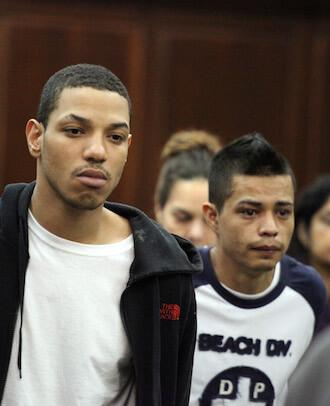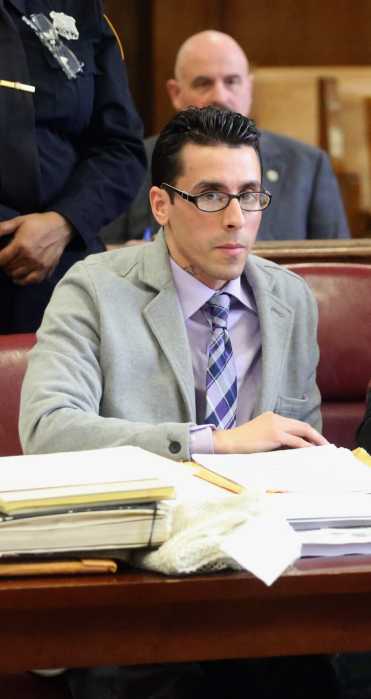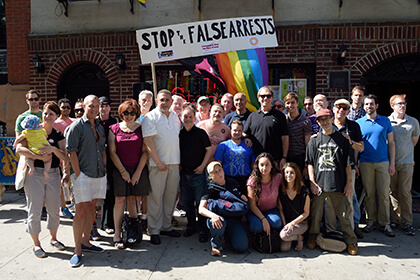With closing arguments completed in the trial of the two accused killers of John Laubach, deliberations are expected to start on October 21.
“You cannot convict these two young men of murder and other serious charges based on the theory that something happened,” Daniel Parker, the attorney for Juan Carlos Martinez-Herrera, told a Manhattan jury on October 20.
Martinez-Herrera, 30, and Edwin Faulkner, 33, are charged with depraved indifference murder; felony murder, based on their having caused Laubach’s 2012 death in the course of committing a felony; and robbery and kidnapping, the felonies that are the basis for the felony murder charge.
When the victim died key difference between prosecutors and defense in 2012 Chelsea killing
The trial, which began with jury selection on September 21, has included over 30 witnesses and more than 150 pieces of evidence. Parker has repeatedly clashed with Bonnie Wittner, the judge in the case, and with the prosecutors, Lanita Hobbs and Juan Abreu.
The defense theory is that Laubach’s death came from a heart attack during consensual sex in which he asked Faulkner to choke him while he performed oral sex on Martinez-Herrera. After the gay couple realized that the 57-year-old gay man was dead, they panicked. They bound his hands and feet and placed duct tape over his mouth. The couple stole Laubach’s possessions and fled to Florida where they were arrested, still holding the stolen goods, roughly two weeks after Laubach was found dead in his Chelsea apartment on March 2.
“Why tie up a dead man?,” Parker asked during a summation that lasted nearly two hours. “People who commit crimes try to cover them up… They wanted to make it look like some intruder came in, tied him up, and took all his stuff… Every fact in this case supports that these two male prostitutes, one on parole and one not a citizen, thought, ‘We’ve got to get out of here.’”
Daniel Scott, who represents Faulkner, endorsed Parker’s closing arguments and delivered a summation that lasted roughly 20 minutes.
“This is a case without a crime, Scott said. “[The prosecution is] asking you to make the leap from petty thief to robber, kidnapper, murderer… My view of the evidence is that there was no crime committed here other than larceny.”
The prosecution’s theory is that the couple wanted money to move to Florida. Jurors heard from a friend who said Martinez-Herrera expressed that desire in the months prior to Laubach’s death. Laubach had been paying the couple for sex in the months prior to his death, and he also allowed them to shower in his home and store possessions there. Faulkner had stolen from Laubach as early as February 20. The older man confronted the couple and demanded the return of his property. At least three witnesses said Laubach told them he was afraid of the couple.
On March 2, according to the district attorney’s office, they gained entry to Laubach’s apartment, the prosecution cannot say how, bound and gagged Laubach so he could not contact police, and stole his property. They tried to use Laubach’s ATM card several times to withdraw cash from his bank account, and they tried to pawn some of his property.
While a prosecution expert testified that Laubach died from asphyxiation, Hobbs said his death may have been caused by a heart attack. For a felony murder conviction, the prosecution does not have to prove the cause of death or that they intended to kill Laubach, only that the death occurred during a robbery or kidnapping. Hobbs has said from the start of the trial that the couple did not intend to kill Laubach, but that the victim was alive when he was bound.
“These defendants obviously did not go to such lengths to tie a dead man to his bed,” Hobbs told jurors. “He was alive… You tie a person to a bed to restrain them. You put tape over their mouth to keep them silent.”
Both defendants admitted to killing Laubach in statements. Martinez-Herrera testified and said the death was an accident during consensual sex. Ultimately, jurors will have to decide if Laubach was dead or alive when the two men tied him up and took his possessions.
“The issue seems to be whether he was dead or alive when they did these things,” Wittner said before closing arguments began. “There’s direct proof of who was there. There are two or three versions of how he died.”
Jurors will consider depraved indifference murder and felony murder, both of which carry a 25-to-life sentence, robbery, kidnapping, and second-degree manslaughter, which carries a sentence of up to 15 years in prison.
Since 2006, the Court of Appeals the state’s highest court, has sharply limited the use of depraved indifference murder and it is not clear that a conviction on that count would survive an appeal. Hobbs deemphasized that count in her closing.



































